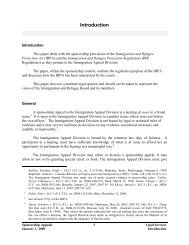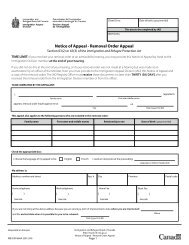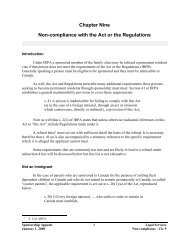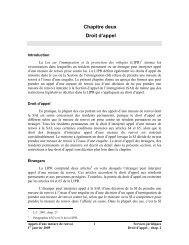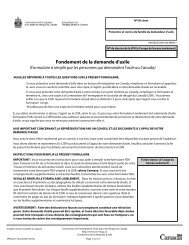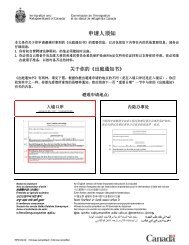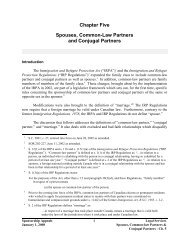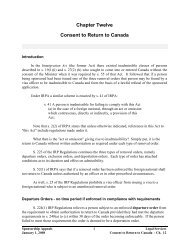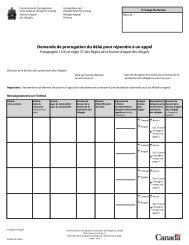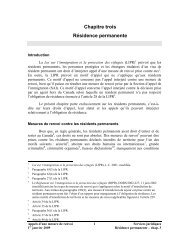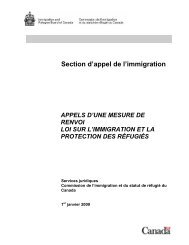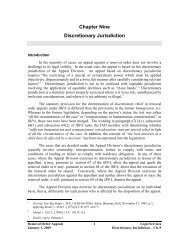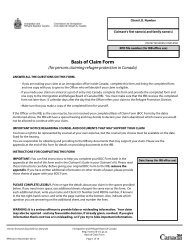Misrepresentation - Immigration and Refugee Board of Canada
Misrepresentation - Immigration and Refugee Board of Canada
Misrepresentation - Immigration and Refugee Board of Canada
Create successful ePaper yourself
Turn your PDF publications into a flip-book with our unique Google optimized e-Paper software.
Chapter Eight<br />
<strong>Misrepresentation</strong><br />
Introduction<br />
The misrepresentation provisions under the old <strong>Immigration</strong> Act provide that a permanent<br />
resident, where granted l<strong>and</strong>ing by reason <strong>of</strong> a false or improperly obtained passport, visa or other<br />
document pertaining to the person’s admission, or by reason <strong>of</strong> any fraudulent or improper means<br />
or misrepresentation <strong>of</strong> any material fact, whether exercised or made by that person or any other<br />
person, may be subject to the initiation <strong>of</strong> removal proceedings under s.27(1)(e) <strong>of</strong> the<br />
<strong>Immigration</strong> Act.<br />
The materiality <strong>of</strong> misrepresentations under the <strong>Immigration</strong> Act has been the subject <strong>of</strong><br />
numerous court decisions including the decision <strong>of</strong> the Supreme Court <strong>of</strong> <strong>Canada</strong> in <strong>Canada</strong><br />
(Minister <strong>of</strong> Manpower <strong>and</strong> <strong>Immigration</strong>) v. Brooks, [1974] S.C.R. 850. Brooks held, among<br />
other things, that mens rea, or intention, was not an essential element for the misrepresentation.<br />
Chapter 5 <strong>of</strong> the Removal Order Appeals paper discusses the impact <strong>of</strong> the Brooks decision <strong>and</strong><br />
misrepresentations in general.<br />
The purpose <strong>of</strong> the misrepresentation provisions is to ensure that applicants provide<br />
complete, honest <strong>and</strong> truthful information in every manner when applying for entry into <strong>Canada</strong>. 1<br />
The misrepresentation provisions under the <strong>Immigration</strong> <strong>and</strong> <strong>Refugee</strong> Protection Act<br />
(IRPA) can lead to a finding <strong>of</strong> inadmissibility (s.40) whether the person is inside <strong>Canada</strong> or<br />
abroad. An inadmissibility report prepared with respect to a permanent resident, may lead to an<br />
inadmissibility hearing before the <strong>Immigration</strong> Division where a removal order may be made.<br />
(s.44(1) & s.44(2)).<br />
Inadmissibility for <strong>Misrepresentation</strong><br />
The misrepresentation provisions under the IRPA can lead to a finding <strong>of</strong> inadmissibility<br />
<strong>of</strong> a permanent resident (leading to a removal order) or a foreign national being refused<br />
sponsorship. Section 40 reads, in part, as follows:<br />
40. (1) A permanent resident or a foreign national is inadmissible for<br />
misrepresentation<br />
(a) for directly or indirectly misrepresenting or withholding material<br />
facts relating to a relevant matter that induces or could induce an error<br />
in the administration <strong>of</strong> this Act;<br />
1<br />
<strong>Immigration</strong> Manuals, ENF 2, Evaluating Inadmissibility, section 9.<br />
Sponsorship Appeals 1 Legal Services<br />
January 1, 2008 <strong>Misrepresentation</strong> - Ch. 8
(b) for being or having been sponsored by a person who is determined<br />
to be inadmissible for misrepresentation;<br />
If a person is found to be inadmissible pursuant to section 40, that permanent resident or<br />
foreign national continues to be inadmissible for misrepresentation for a period <strong>of</strong> two years<br />
following a final determination <strong>of</strong> inadmissibility in a refused sponsorship, or the date the<br />
removal order is enforced for a determination in <strong>Canada</strong>. 2 A person who pursues their appeal<br />
rights following a determination in <strong>Canada</strong> will, in effect, extend the two-year period because the<br />
removal order would not be enforced until a later date.<br />
A foreign national subject to the two-year period <strong>of</strong> continued inadmissibility must obtain<br />
the written authorization <strong>of</strong> an <strong>of</strong>ficer under Regulation 225(3) 3 in order to return to <strong>Canada</strong><br />
within the two-year period.<br />
A further qualification to section 40(1)(b) is found in section 40(2)(b). It provides that<br />
“paragraph (1)(b) does not apply unless the Minister is satisfied that the facts <strong>of</strong> the case justify<br />
the inadmissibility” (emphasis added). It is not known at present how the Minister will exercise<br />
this “justification”.<br />
Possible Legal <strong>and</strong> Evidentiary Issues<br />
Specific wording contained in section 40 <strong>of</strong> the IRPA will likely give rise to legal <strong>and</strong><br />
evidentiary issues. For example, what is the meaning in s. 40(1)(a) <strong>of</strong> the IRPA <strong>of</strong> the phrase “…<br />
directly or indirectly misrepresenting or withholding material facts…”? Does it matter whether<br />
the person made the misrepresentation as opposed to someone else making the<br />
misrepresentation? (Under the former <strong>Immigration</strong> Act, the jurisprudence shows it did not<br />
matter.) Does this include giving untruthful or partial answers, or omitting reference to material<br />
facts (even if the person does not know what is material or was not asked)?<br />
“directly or indirectly”<br />
2<br />
3<br />
Section 40(2)(a) reads as follows:<br />
the permanent resident or the foreign national continues to be inadmissible for misrepresentation for a<br />
period <strong>of</strong> two years following, in the case <strong>of</strong> a determination outside <strong>Canada</strong>, a final determination <strong>of</strong><br />
inadmissibility under subsection (1) or, in the case <strong>of</strong> a determination in <strong>Canada</strong>, the date the removal<br />
order is enforced;<br />
Reg. 225(3) reads as follows:<br />
A foreign national who is issued an exclusion order as a result <strong>of</strong> the application <strong>of</strong> paragraph<br />
40(2)(a) <strong>of</strong> the Act must obtain a written authorization in order to return to <strong>Canada</strong> within the twoyear<br />
period after the exclusion order was enforced.<br />
Sponsorship Appeals 2 Legal Services<br />
January 1, 2008 <strong>Misrepresentation</strong> - Ch. 8
In Wang 4 the IAD adopted the <strong>Immigration</strong> Division member’s analysis <strong>and</strong> conclusion<br />
on indirect misrepresentation. He noted that under IRPA there was no longer a reference to a<br />
misrepresentation “by any other person”. The new language is “directly or indirectly”. The<br />
member held that “it is not immediately apparent by this language that “indirectly” means a<br />
misrepresentation by another person. Nonetheless I can find no other logical interpretation.” The<br />
Federal Court approved this approach. The word “indirectly” can be interpreted to cover the<br />
situation such as the present one where the applicant relied on being included in her husb<strong>and</strong>’s<br />
application, even though she did not know <strong>of</strong> his previous marriage.<br />
“indirect misrepresentation”<br />
An agent for the appellant obtained for him <strong>and</strong> submitted to CIC false or fraudulent<br />
documents relating to his education. This constitutes an indirect misrepresentation. 5<br />
Similarly, what is the meaning in s. 40(1)(a) <strong>of</strong> the IRPA <strong>of</strong> the phrase “… material facts<br />
relating to a relevant matter that induces or could induce an error in the administration <strong>of</strong> this<br />
Act”? How might we interpret “an error in the administration <strong>of</strong> this Act”? [Note: There is a<br />
difference in the wording in the French version which could influence interpretation – rather than<br />
saying that induces it says, as this induces.] Is there a timing element in this provision – does it<br />
catch persons who misrepresent any immigration related circumstances at any time? What might<br />
be included in this provision? For example, does this include an applicant or sponsor making<br />
misrepresentations, partial answers, omissions, etc.; applicants on humanitarian <strong>and</strong><br />
compassionate considerations who became permanent residents; or applicants withholding<br />
information from the examining designated physician?<br />
“could induce an error”<br />
The <strong>Immigration</strong> Appeal Division found the words “could induce an error” as referring to<br />
the potential <strong>of</strong> causing an error at any time, not the actual causing <strong>of</strong> the error. It was meant to<br />
catch those who caused an error or misrepresented or withheld material (an attempt to deceive)<br />
that had a potential <strong>of</strong> causing an error. It does not speak from the time <strong>of</strong> the “catching” <strong>of</strong> the<br />
misdeed, but at the time <strong>of</strong> the misdeed itself. 6<br />
Two factors must be present for a finding <strong>of</strong> inadmissibility under s. 40(1). There must be<br />
misrepresentations by the applicant <strong>and</strong> those misrepresentations must be material in that they<br />
could have induced an error in the administration <strong>of</strong> the IRPA. There is no requirement in s.<br />
40(1)(a) that the misrepresentations must be intentional, deliberate or negligent. 7<br />
4<br />
5<br />
6<br />
7<br />
Wang, Xiao Qiang v. M.C.I. (F.C., no. IMM-5815-04), O’Keefe, August 3, 2005; 2005 FC 1059. A question was<br />
certified but not answered on appeal: (F.C.A., no. A-420-05), Noel, Evans, Malone, October 24, 2006; 2006 FCA<br />
345.<br />
M.P.S.E.P. v. Zhai, Ning (IAD VA6-02206), Ostrowski, March 6, 2007; application for leave <strong>and</strong> judicial review<br />
dismissed: (F.C., no. IMM-2035-07), Harrington, August 13, 2007.<br />
Zhai, supra, footnote 5.<br />
Bellido,Patricia Zevallous v. M.C.I. (F.C., no. IMM-2380-04), Snider, April 6, 2005; 2005 FC 452.<br />
Sponsorship Appeals 3 Legal Services<br />
January 1, 2008 <strong>Misrepresentation</strong> - Ch. 8
In Pierre-Louis 8 the applicant married the appellant in 2001. He applied for a visitor’s<br />
visa in Haiti <strong>and</strong> was refused. On that application he disclosed a child born in 1996. In 2002 he<br />
applied for permanent residence in <strong>Canada</strong>. At that time he said he had no dependent children.<br />
The visa <strong>of</strong>ficer rejected this application because <strong>of</strong> misrepresentations made during the<br />
interview. The applicant was inadmissible because <strong>of</strong> the misrepresentation about the child he<br />
had previously declared.<br />
Finally, what is the meaning in s. 40(1)(b) <strong>of</strong> the IRPA <strong>of</strong> the phrase “…for being or<br />
having been sponsored by a person who is determined to be inadmissible for<br />
misrepresentation.”? Does this put the sponsor at risk <strong>of</strong> removal for making<br />
misrepresentations? If yes, how far back may it go?<br />
Asuncion 9 partly answers the first question. The appellant was sponsored to <strong>Canada</strong> by his<br />
mother as a dependent in 1998. Prior to leaving the Philippines he married his spouse in a civil<br />
ceremony, <strong>and</strong> knew that there would be some sort <strong>of</strong> reprim<strong>and</strong> if he failed to declare his new<br />
status. After he was l<strong>and</strong>ed in <strong>Canada</strong> he returned to the Philippines <strong>and</strong> he <strong>and</strong> his wife had a<br />
church wedding. In 2001 he applied to sponsor his wife <strong>and</strong> two children, which application was<br />
refused since they had not been examined at the time he became a permanent resident. An<br />
admissibility hearing led to a removal order, the appeal <strong>of</strong> which was dismissed. A result <strong>of</strong> the<br />
misrepresentation was that he made it impossible for him to sponsor his loved ones <strong>and</strong> also<br />
prohibited him from seeking to come back to <strong>Canada</strong> for a period <strong>of</strong> two years following the<br />
enforcement <strong>of</strong> the removal order.<br />
Legislative Framework<br />
Section 44 <strong>of</strong> the IRPA, reproduced in part below, sets out the procedure to be followed<br />
under section 40:<br />
44. (1) An <strong>of</strong>ficer who is <strong>of</strong> the opinion that a permanent resident or a foreign<br />
national who is in <strong>Canada</strong> is inadmissible may prepare a report setting out<br />
the relevant facts, which report shall be transmitted to the Minister.<br />
(2) If the Minister is <strong>of</strong> the opinion that the report is well-founded, the<br />
Minister may refer the report to the <strong>Immigration</strong> Division for an<br />
admissibility hearing, except in the case <strong>of</strong> a permanent resident who is<br />
inadmissible solely on the grounds that they have failed to comply with the<br />
residency obligation under section 28 <strong>and</strong> except, in the circumstances<br />
prescribed by the regulations, in the case <strong>of</strong> a foreign national. In those<br />
cases, the Minister may make a removal order.<br />
8<br />
9<br />
Pierre-Louis, Cynthia v. M.C.I. (F.C., no. IMM-7627-04), Beaudry, March17, 2005; 2005 FC 377.<br />
Asuncion, Aristar Mallare v. M.C.I.. (F.C., no. IMM-10231-04), Rouleau, July 20, 2005; 2005 FC 1002.<br />
Sponsorship Appeals 4 Legal Services<br />
January 1, 2008 <strong>Misrepresentation</strong> - Ch. 8
An inadmissibility report prepared with respect to a permanent resident may lead to an<br />
inadmissibility hearing before the <strong>Immigration</strong> Division where a removal order may be made.<br />
The effect <strong>of</strong> s.44(2) <strong>of</strong> the IRPA is that a removal order made against a permanent resident for<br />
misrepresentation must be made by the <strong>Immigration</strong> Division, not by the Minister (except in the<br />
case <strong>of</strong> not complying with the residency obligation). Therefore, the IAD will have a full record<br />
for an appeal against a removal order for misrepresentation.<br />
Jurisdiction – Legislative Appeal Rights to the IAD<br />
Parts <strong>of</strong> sections 63 to 65 <strong>of</strong> the IRPA are set out below:<br />
63. (1) A person who has filed in the prescribed manner an application to<br />
sponsor a foreign national as a member <strong>of</strong> the family class may appeal to the<br />
<strong>Immigration</strong> Appeal Division against a decision not to issue the foreign<br />
national a permanent resident visa.<br />
63. (2) A foreign national who holds a permanent resident visa may appeal to<br />
the <strong>Immigration</strong> Appeal Division against a decision at an examination or<br />
admissibility hearing to make a removal order against them.<br />
63. (3) A permanent resident or a protected person may appeal to the<br />
<strong>Immigration</strong> Appeal Division against a decision at an examination or<br />
admissibility hearing to make a removal order against them.<br />
63. (4) A permanent resident may appeal to the <strong>Immigration</strong> Appeal Division<br />
against a decision made outside <strong>of</strong> <strong>Canada</strong> on the residency obligation under<br />
section 28.<br />
63. (5) The Minister may appeal to the <strong>Immigration</strong> Appeal Division against a<br />
decision <strong>of</strong> the <strong>Immigration</strong> Division in an admissibility hearing.<br />
64. (3) No appeal may be made under subsection 63(1) in respect <strong>of</strong> a decision<br />
that was based on a finding <strong>of</strong> inadmissibility on the ground <strong>of</strong><br />
misrepresentation, unless the foreign national in question is the sponsor’s<br />
spouse, common-law partner or child.<br />
65. In an appeal under subsection 63(1) or (2) respecting an application based on<br />
membership in the family class, the <strong>Immigration</strong> Appeal Division may not<br />
consider humanitarian <strong>and</strong> compassionate considerations unless it has<br />
decided that the foreign national is a member <strong>of</strong> the family class <strong>and</strong> that<br />
their sponsor is a sponsor within the meaning <strong>of</strong> the regulations.<br />
Note that the effect <strong>of</strong> s.64(3) <strong>of</strong> the IRPA is that a spouse, common-law partner or child<br />
does have an appeal to the IAD, but other members <strong>of</strong> the family class, such as parents, do not<br />
Sponsorship Appeals 5 Legal Services<br />
January 1, 2008 <strong>Misrepresentation</strong> - Ch. 8
have an appeal to the IAD if found inadmissible for misrepresentation. In decisions 10 <strong>of</strong> the IAD<br />
where the applicant was not the sponsor’s spouse, common-law partner or child, the IAD has<br />
dismissed the appeals for lack <strong>of</strong> jurisdiction. In none <strong>of</strong> these cases has the appellant sought<br />
judicial review.<br />
In Mathew 11 the IAD allowed the appeal under s. 65 <strong>of</strong> the IRPA on humanitarian <strong>and</strong><br />
compassionate grounds <strong>and</strong> then found the marriage to be genuine, overcoming the<br />
inadmissibility for misrepresentation. The Court held that Parliament’s intent was clear that<br />
before waiving a breach <strong>of</strong> the Act (the misrepresentation) on H&C factors, the marriage, if<br />
challenged, as it was here, had to be determined to be genuine before applying the H&C factors.<br />
The Minister’s application was allowed.<br />
The requirements to sponsor a member <strong>of</strong> the family class are found in Regulation 130.<br />
10 Warrich, Ghazananfar v. M.C.I. (IAD TA3-20264), D’Ignazio, July 11, 2005; Nazmus, Masoma v. M.C.I. (IAD<br />
TA6-03843), Whist, September 18, 2006; Anis, Kamran v. M.C.I. (IAD TA7-01595), Waters, August 31, 2007.<br />
11 M.C.I. v. Mathew, Marjorie Ellen (F.C., no. IMM-6049-06), Lemieux, June 29, 2007; 2007 FC 685.<br />
Sponsorship Appeals 6 Legal Services<br />
January 1, 2008 <strong>Misrepresentation</strong> - Ch. 8
Transitional Issues<br />
Section 192 <strong>of</strong> the IRPA provides as follows:<br />
192. If a notice <strong>of</strong> appeal has been filed with the <strong>Immigration</strong><br />
Appeal Division immediately before the coming into force <strong>of</strong> this<br />
section, the appeal shall be continued under the former Act by the<br />
<strong>Immigration</strong> Appeal Division <strong>of</strong> the <strong>Board</strong>.<br />
The IRPA came into force on June 28, 2002. In Manzanares 12 the refusal letter pre-dated<br />
the implementation date <strong>of</strong> the IRPA <strong>and</strong> was, therefore, a refusal under the <strong>Immigration</strong> Act.<br />
The Notice <strong>of</strong> Appeal, however, was dated <strong>and</strong> was thus filed after the IRPA was proclaimed.<br />
Pursuant to section 192 <strong>of</strong> the IRPA, the panel proceeded with the appeal under the IRPA.<br />
At the outset <strong>of</strong> the hearing, the Minister raised a preliminary issue. He asked the panel to<br />
treat the refusal based on the ground <strong>of</strong> misrepresentation under section 40(1)(a) <strong>of</strong> the IRPA.<br />
The panel rejected this argument by the Minister. There had been a misrepresentation by the<br />
applicant (by filing false documents with the visa post) but it was not a refusal based on the<br />
ground <strong>of</strong> misrepresentation (such as a refusal under section 9(3) <strong>of</strong> the <strong>Immigration</strong> Act).<br />
Further, there was no application by the Minister to amend the ground <strong>of</strong> refusal <strong>and</strong>, therefore,<br />
there was no legal basis to treat the refusal as one based on misrepresentation.<br />
General Offences<br />
It should be noted that there are criminal sanctions in respect <strong>of</strong> misrepresentations in the<br />
IRPA. Because these <strong>of</strong>fences are beyond the scope <strong>of</strong> this paper they are merely reproduced<br />
below for ease <strong>of</strong> reference.<br />
126. Every person who knowingly counsels, induces, aids or abets or attempts to counsel,<br />
induce, aid or abet any person to directly or indirectly misrepresent or withhold material facts<br />
relating to a relevant matter that induces or could induce an error in the administration <strong>of</strong> this Act<br />
is guilty <strong>of</strong> an <strong>of</strong>fence.<br />
127. No person shall knowingly<br />
(a) directly or indirectly misrepresent or withhold material facts relating to a relevant<br />
matter that induces or could induce an error in the administration <strong>of</strong> this Act.<br />
12 Manzanares, Ma Christina v. M.C.I. (IAD TA2-15088, Stein, June 9, 2003.<br />
Sponsorship Appeals 7 Legal Services<br />
January 1, 2008 <strong>Misrepresentation</strong> - Ch. 8
CASES<br />
Anis, Kamran v. M.C.I. (IAD TA7-01595), Waters, August 31, 2007 .......................................................................... 6<br />
Asuncion, Aristar Mallare v. M.C.I.. (F.C., no. IMM-10231-04), Rouleau, July 20, 2005; 2005 FC<br />
1002........................................................................................................................................................................... 4<br />
Bellido,Patricia Zevallous v. M.C.I. (F.C., no. IMM-2380-04), Snider, April 6, 2005; 2005 FC 452........................... 3<br />
<strong>Canada</strong> (Minister <strong>of</strong> Manpower <strong>and</strong> <strong>Immigration</strong>) v. Brooks, [1974] S.C.R. 850......................................................... 1<br />
M.P.S.E.P. v. Zhai, Ning (IAD VA6-02206), Ostrowski, March 6, 2007...................................................................... 3<br />
Manzanares, Ma Christina v. M.C.I. (IAD TA2-15088, Stein, June 9, 2003 ............................................................... 7<br />
Mathew: M.C.I. v. Mathew, Marjorie Ellen (F.C., no. IMM-6049-06), Lemieux, June 29, 2007;<br />
2007 FC 685.............................................................................................................................................................. 6<br />
Nazmus, Masoma v. M.C.I. (IAD TA6-03843), Whist, September 18, 2006 ................................................................ 6<br />
Pierre-Louis, Cynthia v. M.C.I. (F.C., no. IMM-7627-04), Beaudry, March17, 2005; 2005 FC 377............................ 4<br />
Wang, Xiao Qiang v. M.C.I. (F.C., no. IMM-5815-04), O’Keefe, August 3, 2005; 2005 FC 1059 .............................. 3<br />
Warrich, Ghazananfar v. M.C.I. (IAD TA3-20264), D’Ignazio, July 11, 2005 ............................................................ 6<br />
Sponsorship Appeals 8 Legal Services<br />
January 1, 2008 <strong>Misrepresentation</strong> - Ch. 8



